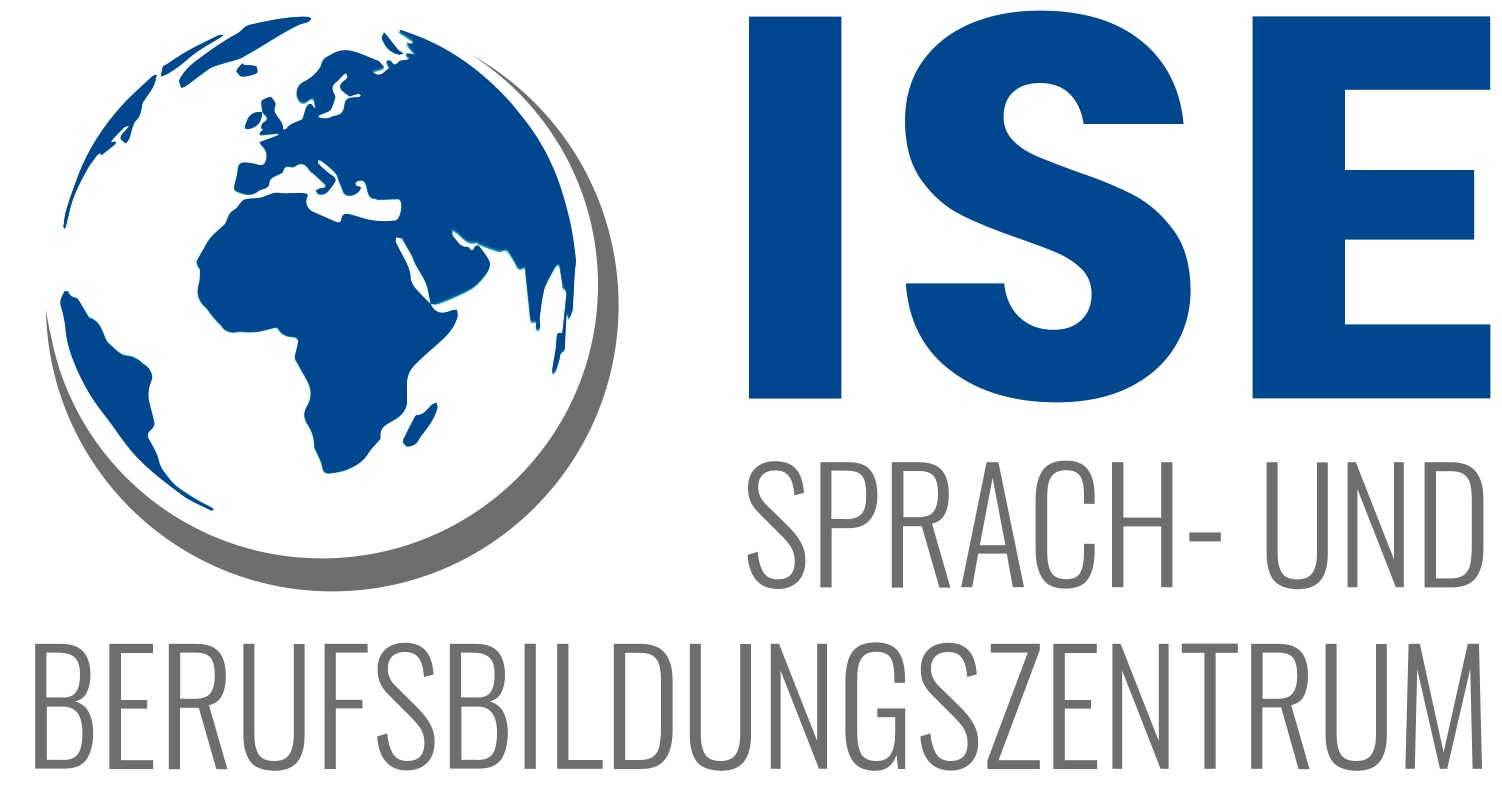
Registration and location:
ISE Sprach- und Berufsbildungszentrum GmbH
Kaiser-Ludwig-Ring 9, 92224 Amberg
Phone: 09621 7868-0
E-Mail: info@ise-berufsbildung.de
Duration of measure:
1. Translation
19.03.2025 – 29.09.2025
(Pre-qualification or Module 1, duration: 6 months),
19.03.2025 – 18.03.2026
(Pre-qualification or Module 1, duration: 12 months),
2. C throughcraft
16.09.2025 – 06.03.2026
(Pre-qualification or Module 1, duration: 6 months),
16.09.2025 – 31.08.2026
(Pre-qualification or Module 1, duration: 12 months),
in connection:
Retraining to become a warehouse clerk (16 months)
Class times:
Monday - Friday
08:00 a.m. – 3:15 p.m
Target group: People with a migration background who are registered with the employment agency/job center.
Financial support: If the personal requirements are met, funding can be provided by the Employment Agency through an educational voucher. Additionally, other entities such as the German Pension Insurance, Bundeswehr, Jobcenter, private insurances, etc., or private individuals may cover the costs of the course.
Number of participants: 14 – 25 people
Certificate of Participation: Participants receive an ISE certificate, a certificate of participation and, if they pass the final examination at the IHK, an IHK certificate with a professional qualification.
Contact persons:
Hr. Richard Kirschner, Phone: 09621 7868-14, E-Mail: richard.kirschner@ise-berufsbildung.de
Hr. Roland Domogalla, Phone: 09621 7868-20, E-Mail: roland.domogalla@ise-berufsbildung.de
Do you have any questions? Contact us, we're here to assist you!
Here you will receive
Information material to download:
This year, the ISE language and vocational training center is offering a modular qualification with a vocational qualification in the training profession of warehouse clerk (IHK). The qualification to become a warehouse logistics employee by acquiring a forklift license and with job-related German provides a broad basic knowledge of the warehouse logistics area and job-specific language skills.
The second module involves 16 months of retraining to become a specialist warehouse clerk. The measure can be funded through an education voucher and takes place at Kaiser-Ludwig-Ring 9 (near the post office/train station) in Amberg.
In two steps to a recognized professional qualification!
With language support and forklift training!
Modular advanced course:

Qualification process:
- The purpose of the pre-qualification is to determine the suitability for participation in the subsequent one Retraining to become a warehouse clerk (16 months) to produce.
- The exact contents can be found inside!
- The practical pre-qualification (Module 1) includes 1,600 teaching units including German language training and 160 units of in-company testing*.
- The subsequent one Retraining to become a warehouse clerk (16 months) (Module 2) includes 1,920 teaching units and 400 units of in-company internship.
(One teaching or internship unit is 45 minutes each.) - Participants are granted approximately 26 days of vacation per year of the retraining period. The vacation days are determined by ISE and communicated at the start of the course.
1. Module (12 months): Qualification to become a warehouse logistics employee with the acquisition of a forklift license and with job-related German or practical pre-qualification
Simple basics from the areas
- Materials management, procurement
- Warehousing, picking
- Logistics, material flow design
- Storage technology
- Shipping, packaging, transport
Imparting job-related language skills
- communicate with colleagues in the warehouse
- Know activities and tasks in the warehouse
- Know about cooperation and incidents in the warehouse
- Plan, agree and coordinate workflows
- Know work areas in warehouse and logistics
- Equipment, communication and advertising
- Everyday life in warehouse operations and occupational safety
- Behavior at work, social skills
- Learn subject-related vocabulary (in warehouse logistics).
Forklift training
- Acquisition of the state-recognized forklift license
- Duration of training: 3 – 5 days
- theoretical and practical driving training
practical practice days
- in cooperative companies
- Practical instruction in various warehouse activities
Application training and job search
2. Module (16 Months): Retraining to become a warehouse clerk (16 months)
Vocational training, labor and collective bargaining law
a) Explain the meaning of the training contract, in particular its conclusion, duration and termination
b) mutual rights and obligations from the training contract
to name
c) Mention options for further professional training
d) name essential parts of the employment contract
e) name the essential provisions of the collective agreements applicable to the training company
Structure and organization of the training company
a) Explain the structure and tasks of the training company
b) Explain basic functions of the training company such as procurement, production, sales and administration
c) State the relationships between the training company and its employees and business organizations, professional representatives and trade unions
d) Describe the basics, tasks and working methods of the works constitution or personnel representation bodies of the training company
Safety and health protection at work
a) Identify threats to safety and health at work and take measures to avoid them
b) apply job-related occupational safety and accident prevention regulations
c) Describe behavior in the event of an accident and initiate initial measures
d) apply preventive fire protection regulations; Describe fire behavior and take fire-fighting measures
environmental Protection
Contribute to the avoidance of operational environmental pollution in the area of occupational influence, in particular
a) explain possible environmental impacts caused by the training company and its contribution to environmental protection using examples
b) apply environmental protection regulations applicable to the training company
c) Use opportunities for economical and environmentally friendly use of energy and materials
d) avoid waste; Dispose of substances and materials in an environmentally friendly manner
work organization; information and communication
a) classify the storage and transport area as well as your own work area into the operational process and derive consequences for your own actions from this
b) Implement work orders into work processes according to operational specifications; Execute work orders in a customer-oriented manner
c) use operational information and communication systems taking into account application-related networking as well as data security and data protection
d) use workplace-related software
e) use foreign language technical terms
f) communicate with preceding and subsequent functional areas
g) Consider the effects of information, communication and cooperation on the working atmosphere and work performance
h) Work on tasks in a team
Goods inspection and quality assurance measures
a) Distinguish and handle goods according to their nature and use
b) Observe standards, dimensions, quantity and weight units
c) apply legal and operational regulations for goods-specific storage
d) Handle goods, in particular dangerous goods, dangerous working materials, customs goods, perishable goods, according to their properties and taking into account labels and symbols
e) apply legal and relevant regulations for packaging and transport
f) carry out quality assurance measures in your own work area, thereby contributing to the continuous improvement of work processes
h) participate in the processing of complaints
Use of work equipment
a) Select and use work equipment for weighing, measuring and counting
b) Use work and funding resources
c) Maintain work and funding equipment and check their functionality and readiness for use; Arrange for the removal of impairments
Acceptance of goods
a) Check accompanying documents for accuracy and completeness, taking into account customs and dangerous goods regulations and in accordance with operational requirements
b) unloading goods
c) carry out quantitative and qualitative goods inspections, record input data and create error protocols
d) Arrange for defects to be rectified
e) Carry out and document the return of empties, packaging and loading aids in accordance with legal and operational requirements
f) Deliver goods to their destination
Storage of goods
a) Label and sort goods, form storage and sales units and prepare goods for storage
b) Store goods in compliance with storage regulations
c) Carry out measures to maintain quality and value
d) Check inventory levels and report deviations
e) Distinguish inventory key figures
Picking and packing of goods
a) Check order documents and prepare picking
b) Remove goods from the warehouse taking into account the change in inventory and the removal principles
c) Select transport packaging and filling materials with regard to the type of goods, mode of transport, environmental compatibility and economic viability
d) Assemble and pack goods into loading units
e) check assembled shipments and accompanying documents for completeness, mark, label and secure transport goods
Shipping of goods
a) Prepare shipments ready for loading for specified means of transport
b) Determine the weight and space requirements of goods
c) Load and stow shipments according to the characteristics of the goods and the means of transport
d) Secure loads and apply locking regulations
e) compare loads and accompanying documents; Report discrepancies
Other important information:
- During the training, practical instructions take place in the Loxxess warehouse, Jubatus-Allee 6, 92263 Ebermannsdorf.
- The forklift training takes place over 3 to 5 days of instruction at the traffic training center in Amberg.
- The costs of the measures are explained in the training contract.
There are no costs for holders of an education voucher. - Literature provided as part of the cost of the measure: Logistical processes, course and workbook, specialist arithmetic, economic and social processes.
- Costs for the professional clothing required to carry out the internship will be covered by ISE.
Certification: The ISE Language and Vocational Training Center is an approved provider under employment promotion law. Approved by the expert body of TÜV Rheinland Cert GmbH – a certification body accredited by the German Accreditation Body (DAkkS).

